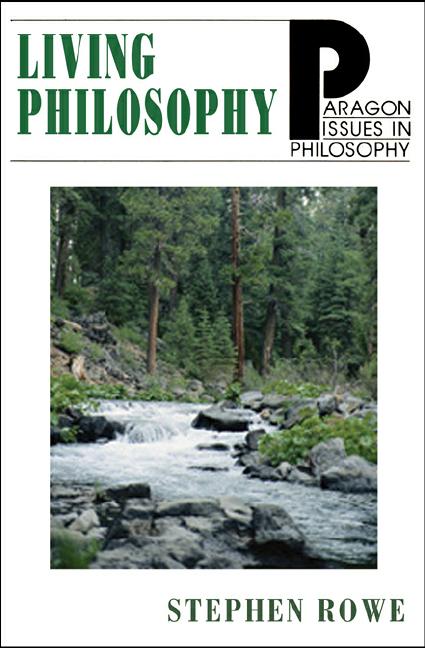Living Philosophy has real potential for turning philosophy
back to the things that really matter.
—Huston Smith, author of The World's Religions
What a joy this book is!
What a joy this book is! Here philosophy
lives and breathes, sometimes playful, sometimes greatly sober, full of
love and care for humanity and its frightened, yearning children. Here
philosophy is no longer gray, but iridescent. May it find the place it
deserves-both in our universities and in the quiet hours of any man or
woman's own personal search for meaning.
—Jacob Needleman, Professor of Philosophy, author of The Heart
of Philosophy, Time and the Soul
I love the framing, the approach, the openness…
I love the framing, the approach, the openness in many senses, and of
course the deep invitation to thinking with.…It would be wonderful
if people would join the work in the world this book invites us to as
philosophers.
—Elizabeth Karmarck Minnich, Professor of Philosophy and of Women's
Studies, Union Graduate School, author of Transforming Knowledge
Artfully blending his mastery of philosophical tradition…
Artfully blending
his mastery of philosophical tradition—East and West—with insightful
personal reflection, Stephen Rowe extends a warm invitation to think deeply
about the human concerns that matter most.… As it creatively breaks
conventional boundaries, Living Philosophy promotes a new birth of philosophical
freedom that can do much to make human existence more thoughtful, caring,
and humane as the 21st century gets under way.
—John K. Roth, professor Philosophy, author of Approaches to Auschwitz
and other books, recipient of U.S. Carnegie Professor of the Year
Award
Living Philosophy takes philosophical wisdom back to
the world of real life
Philosophy is an age old discipline of inquiry. Maybe exactly
because of the excessive burden of the wisdom of the past times, it lost
its spirituality in the current world. It either indulges in the metaphysical
speculations far detached from real life, or becomes disoriented in its
pursuit in linguistic analysis. In the eyes of the public, it becomes
the ugly.… Living Philosophy takes philosophical wisdom back
to the world of real life through the reflection of Socratic philosophical
practice. It shows us that as long as philosophy is able to respond to
the challenges of the world of life, it will not lose its own vitality.
—Yu Wujin, Professor of Philosophy, Fudan University, and Consulting
Expert of Shanghai Government, P.R.C.
Fresh, inviting, open, compelling
Living Philosophy is a
radical book that returns us to the roots of philosophy—as the experience
of wonder, immediacy and awakening. The Delphic Oracle counseled, "Know
thyself"—and Dogen Zenji, the medieval Japanese Soto Zen master,
declared that to study the self is to forget the self—and awakened
to the world Rowe's book unites these traditions of West and East. It
is fresh, inviting, open, compelling—and shows us that indeed, one
can not only think philosophy, but live it.
—Steve Smith, Professor of Philosophy, Claremont McKenna College
People today hunger for what is variously called self help, continuing education, lifespan development, spirituality-something fundamental that is missing in life today. This book is a fresh and highly practical presentation of a traditional Western resource to satisfy that need: Philosophy-as a relational practice through which we are able to live the good life, guided by the Socratic vision of human development and maturity. Out of encounter with the vitalities of Eastern culture, the feminist revolution, and the environmental movement, as well as movements toward "dialogue" in both philosophy and culture, the original Socratic practice of philosophy becomes available again.
Living Philosophy is personal and experiential. It arises out of dialogue with widely recognized philosophers of our era. It provides practical steps, methods, recommendations, and examples for living the good life. It is concrete and empirical, rich in variety and interest.
Living Philosophy is readily accessible to the general reader, whoever that person might be by other descriptions. It is non technical. More importantly, it is written specifically for the contemporary reader who is too busy, yet at the same time who honors reading as practice that can have profoundly positive results. There is a "workbook" character to this book, with such features as dialogue questions at the end of each chapter, a Core Bibliography, and specific suggestions about the keeping of a philosophical journal.





